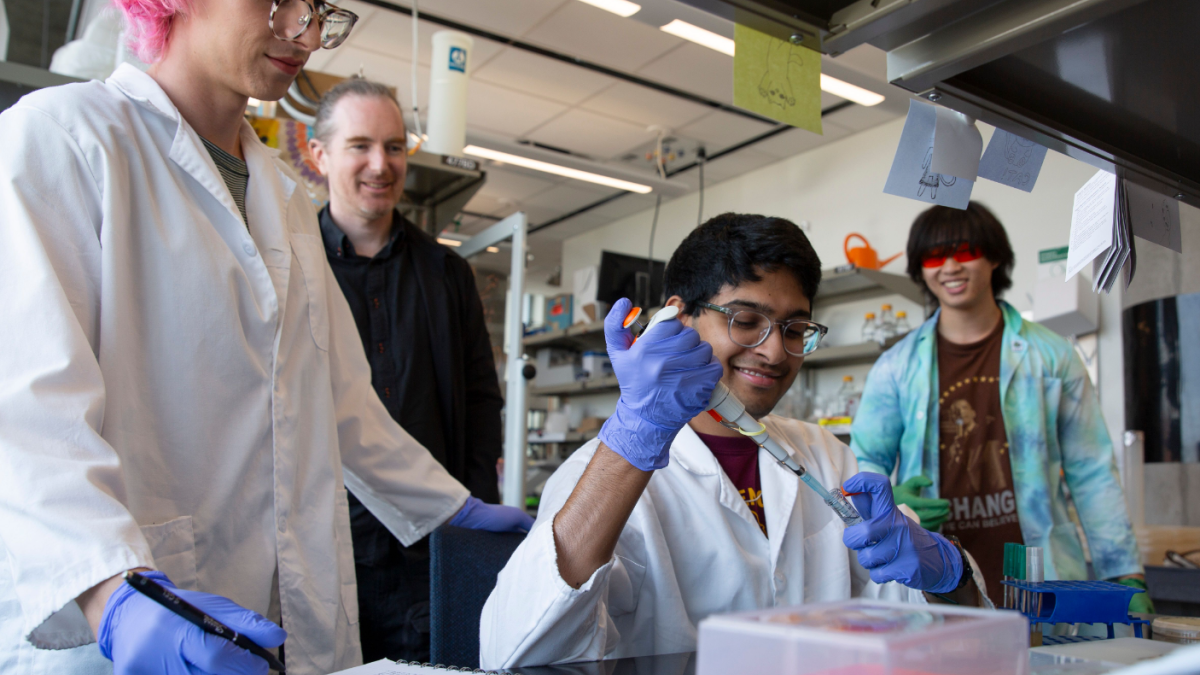Award-winning student team to participate in international competition

From left: Biomedical engineering sophomore Brianna Branson, Assistant Professor of biomedical engineering Benjamin Bartelle, chemical engineering sophomore Pranav Bhavaraju and computer science sophomore Patrick Jiang discuss synthetic biology principles used in the 2023 International
Genetically Engineered Machine, or iGEM, project. Students in the Ira A. Fulton Schools of Engineering at Arizona State University are competing in the iGEM Foundation’s international Grand Jamboree for the third year in a row and hope to medal for the third time. Photo by Erika Gronek/ASU
In the bustling realm of academia where students are often directed by curriculums and coursework, Arizona State University’s award-winning International Genetically Engineered Machine, or iGEM, team empowers students to design their own research projects.
Recently it was announced that, for the third consecutive year, the ASU iGEM team will participate in the Grand Jamboree competition hosted by the International Genetically Engineered Machine (iGEM) Foundation. The global event challenges college students to tackle local environmental issues using synthetic biology principles.
The 2023 ASU cohort is collaborating to engineer bacteria that could safeguard drinking water from per- and polyfluoroalkyl substances, or PFAS, which can cause a range of health issues.
Brianna Branson, a biomedical engineering sophomore and member of the 2023 iGEM team, says there are currently no sustainable solutions for managing PFAS.
“The Centers for Disease Control (and Prevention) found that around 97% of Americans have some level of PFAS in their blood system,” Branson said. “It’s a huge problem that we have difficulty tackling because there isn’t really any effective way of breaking (PFAS) down. Our goal is to create a bacteria that will biodegrade the PFAS chemical to remove it from the ecosystem.”
Student-led research
More than 400 multidisciplinary student-led research teams that pass the preliminary requirements converge at the Grand Jamboree competition to present their synthetic biology projects. The projects are designed to benefit academic institutions, municipalities, nonprofits, startups, industry professionals and investors.
Christopher Plaisier and Benjamin Bartelle, assistant professors of biomedical engineering in the Ira A. Fulton Schools of Engineering, provide mentorship and lab space as well as an official class, BME 494: Synthetic Biology, for weekly meetings of the ASU iGEM team.
Though Bartelle leads the class, students manage the design, building, testing, execution and analysis of the project — from generating a research topic to conducting experiments and everything in between, iGEM students are engaged during the entire research process.
Bartelle says the type of mentorship he provides for iGEM students is different due to the independent nature of the program.
“I do not tell them what to do,” Bartelle said. “The spirit of iGEM is to learn by failing fast and often. This is one of the rare occasions in their education where they have that opportunity. Sometimes they surprise me with things I hadn’t considered, which is very rewarding. Seeing the team’s skills accelerate and how they’re finding their scientific voice really makes my day.”
Fighting off ‘forever chemicals’
PFAS, which are used in Teflon in nonstick pans, waterproof mascara and countless other household products, were originally renowned for their stability due to a strong carbon-fluorine bond. PFAS have since been discovered to disrupt hormone regulation and cause a range of adverse health effects, including cancer and liver damage, decreased fertility and an increased risk of asthma and thyroid disease. Due to the stability of the carbon-fluorine bonds, PFAS will take several thousand years to dissolve, earning them the nickname “forever chemicals.”
At present, the ASU iGEM team is developing the metabolic abilities of the bacteria they engineered to help fight PFAS and is on track to see defluorinating activity that will break down the strong bonds holding the chemicals together by September.
Pranav Bhavaraju, a chemical engineering sophomore and member of the 2023 iGEM team, believes in the methods that the team is developing.
“Bacterial enzymes are catalysts by nature and can be very powerful,” Bhavaraju said. “By engineering bacteria to remediate a synthetic chemical, we can make an impossible reaction possible. That bacteria holds that much power.”
iGEM Grand Jamboree success
Previously, the ASU iGEM team earned gold and bronze rankings in 2021 and 2022, respectively, and they hope to continue that medal-ranking streak this November at the Grand Jamboree in Paris.
Past iGEM members say that while attending seminars and networking with academic and industry professionals, they’ve met the authors of papers they’ve cited in their projects.
Priyati Sharma, a biomedical engineering senior and member of the 2021 and 2022 iGEM cohorts, says that participating in iGEM made her feel well equipped for her future career as an engineer.
“As an undergraduate student, it’s rare to find opportunities to be solely in charge of the progress of your own research,” Sharma said. “However, being thrust into a learning environment like the iGEM competition means you have to develop those skills pretty quickly, which is intimidating, but it allows you to grow a lot as a researcher in a short amount of time.”
2023 iGEM team members:
Rori Hoover, co-captain, biomedical engineering
Patrick Jiang, co-captain, computer science
Brianna Branson, biomedical engineering
Isabella Lirtzman, biological science
Evie Nguyen, biochemical engineering
Caden Elizalde, global health
Anwar Gadhi, BSE biomedical engineering
Kylie Hartana, biomedical engineering
Tahmid Anwar, biomedical engineering
Pranab Bhavaraju, chemical engineering
More Local, national and global affairs

First-ever Taiwan Symposium at Thunderbird celebrates business, cultural connections
The investment by TSMC and other Taiwanese corporations in Arizona will reap dividends not only in thousands of new jobs but also…

Study shows that trust drives successful market economies — but not in the way you may think
From fueling our cars to fulfilling daily coffee habits, the average U.S. cardholder makes 251 credit card transactions per year…

Higher education key to US competitiveness, security
ASU President Michael Crow’s notion of universities as public service institutions — places that serve society in practical and…

